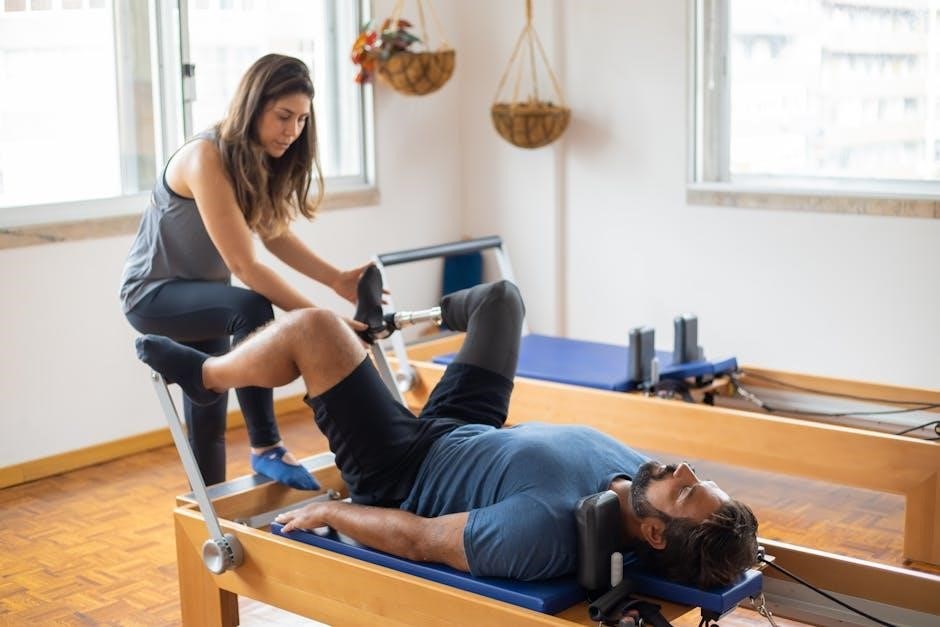
This guide provides a comprehensive roadmap for occupational therapy students preparing for the NBCOT exam, offering strategies, resources, and insights to ensure success. Mastering key concepts, leveraging practice exams, and maintaining a structured study plan are emphasized to build confidence and competence.
1.1 Understanding the Importance of the NBCOT Exam
The NBCOT exam is a critical milestone for occupational therapy professionals, ensuring they meet national competency standards. Passing this exam is mandatory for certification, which is often required for state licensure and employment. It assesses a candidate’s ability to apply knowledge and skills safely and effectively in clinical practice. The exam reflects the scope of occupational therapy, covering areas like patient evaluation, intervention planning, and outcome measurement. By passing, candidates demonstrate their readiness to provide high-quality care, enhancing both patient outcomes and their professional credibility.
1.2 Overview of the Exam Format and Content
The NBCOT exam consists of multiple-choice questions (MCQs) and clinical simulation test (CST) questions, designed to assess both theoretical knowledge and practical application. The exam is divided into four domains: evaluation, intervention, outcomes, and professional responsibilities. Content areas include physical disabilities, pediatrics, mental health, and gerontology. Candidates must demonstrate their ability to analyze patient data, develop treatment plans, and evaluate outcomes. The exam is computer-based, with a set time limit, ensuring a comprehensive evaluation of competency in occupational therapy practice. Understanding the format and content is essential for effective preparation and success.

Creating a Study Plan for the NBCOT Exam
A well-structured study plan is essential for NBCOT success, ensuring organized learning, time management, and strategic focus on key topics and skills.
2.1 Setting Realistic Goals and Time Management
Setting realistic goals and managing time effectively are crucial for NBCOT exam success. Start by breaking down study material into manageable sections, creating a balanced schedule that covers all domains. Allocate specific times for each topic, prioritizing challenging areas; Use tools like calendars or planners to track progress and stay organized. Incorporate breaks to maintain focus and avoid burnout. Regularly review and adjust your plan to ensure alignment with your goals. Consistency and adaptability are key to mastering the material efficiently.
2.2 Prioritizing High-Yield Topics
Prioritizing high-yield topics ensures focused study on areas most likely to appear on the NBCOT exam. Review the exam content outline to identify key domains, such as physical disabilities, pediatrics, and mental health. Allocate more study time to high-weight sections. Use practice exams and performance reports to pinpoint weaknesses. Consider using flashcards or study guides that highlight critical concepts. Tailor your study plan to emphasize these areas while maintaining a balanced approach to cover all domains. This strategic focus maximizes efficiency and boosts confidence in tackling challenging questions.
2.3 Incorporating Active Learning Techniques
Active learning enhances retention and understanding by engaging with material interactively. Techniques include group study sessions, teaching concepts to peers, and self-quizzing. Use flashcards to test recall and create concept maps to visualize relationships between topics. Role-playing clinical scenarios and case studies helps apply theoretical knowledge. Actively summarizing notes in your own words and discussing complex ideas with others also deepens comprehension. These methods promote critical thinking and practical application, making study sessions more effective and exam preparation more robust. Regular use of these techniques fosters confidence and improves problem-solving skills.
2.4 Balancing Study and Self-Care
Balancing study and self-care is crucial for maintaining mental and physical well-being during exam preparation. Establishing a routine that includes regular exercise, meditation, and healthy eating helps sustain energy levels and focus. Schedule breaks and prioritize activities that bring relaxation, such as reading or spending time with loved ones. Neglecting self-care can lead to burnout, reducing productivity and exam performance. Remember, rest and relaxation are essential for cognitive function and long-term success. Make self-care a non-negotiable part of your study plan to ensure you remain motivated and resilient throughout your preparation journey.

Recommended Study Resources for the NBCOT Exam
Key resources include NBCOT flashcards, TherapyEd review guides, and practice exams. These tools help reinforce knowledge, improve retention, and build confidence for exam success effectively.
3.1 NBCOT Flashcards and Knowledge Match Games
NBCOT flashcards and knowledge match games are excellent tools for active learning. Flashcards help memorize key terms, interventions, and concepts, while match games enhance retention through interactive engagement. These resources target high-yield topics, allowing focused study on critical areas. Regular use improves recall speed and accuracy, simulating exam conditions. Pairing flashcards with spaced repetition systems optimizes long-term retention. Knowledge match games also identify weak areas, guiding targeted review. Together, they provide a dynamic, effective way to master NBCOT content and build confidence for test day. Consistent practice with these tools is essential for success.
3.2 TherapyEd National Occupational Therapy Certification Exam Review
The TherapyEd National Occupational Therapy Certification Exam Review is a comprehensive resource designed to prepare candidates for the NBCOT exam. It offers detailed study guides, practice questions, and case studies aligned with the exam content. The guide covers the entire scope of occupational therapy practice, focusing on key areas like clinical reasoning, interventions, and professional responsibilities. It also includes a mock exam to simulate test-day conditions, helping candidates assess their readiness. Regular use of TherapyEd enhances test-taking skills and builds confidence, making it an invaluable tool for exam success. Combine it with other study methods for optimal preparation.
3.3 Occupational Therapy Examination Review Guide by Rita P. Fleming-Castaldy
The Occupational Therapy Examination Review Guide by Rita P. Fleming-Castaldy is a trusted resource for NBCOT exam preparation. It provides a comprehensive overview of occupational therapy principles, practice areas, and clinical reasoning. The guide includes practice questions, case studies, and detailed rationales to enhance understanding. Organized by key domains and tasks, it aligns closely with the NBCOT exam blueprint. Additional resources, such as a CD-ROM with practice exams, simulate real test conditions. This guide is particularly effective for reinforcing knowledge retention and improving clinical decision-making skills, making it a valuable asset for exam success. Its structured approach ensures focused and efficient study.

Understanding the Exam Format and Question Types
The NBCOT exam assesses knowledge and clinical reasoning through multiple-choice questions (MCQs) and clinical simulation tests (CSTs). The format includes 170 MCQs and 4 CSTs, divided into sections.
4.1 Multiple-Choice Questions (MCQs)
The NBCOT exam features 170 multiple-choice questions (MCQs) designed to assess knowledge and clinical reasoning. These questions cover a wide range of topics, including pediatrics, physical disabilities, mental health, and gerontology. Each MCQ presents a scenario or question with four possible answers, requiring test-takers to select the most appropriate response. Time management is crucial, as candidates have approximately 1.5 hours for this section. Strategies include eliminating incorrect options, understanding question stems, and focusing on key terms. Practicing with sample MCQs helps build familiarity with the format and improves decision-making skills under timed conditions.
4.2 Clinical Simulation Test (CST) Questions
The Clinical Simulation Test (CST) consists of 12 interactive questions that mimic real-world clinical scenarios. These questions assess problem-solving and decision-making skills, requiring candidates to evaluate client cases, identify priorities, and select appropriate interventions. Each CST presents a virtual client with specific goals, medical conditions, and contextual factors; Test-takers must demonstrate their ability to analyze data, choose relevant assessments, and develop occupation-based plans. Time management is critical, as each CST has a set time limit. Practicing CST-style questions helps build clinical reasoning and familiarity with the format.

Effective Study Techniques for Occupational Therapy Exam Prep
Effective study techniques, such as active learning, spaced repetition, and self-testing, enhance retention and comprehension. A structured plan ensures consistent progress and mastery of key concepts.
5.1 Using Practice Exams to Assess Readiness
Practice exams are a cornerstone of effective exam preparation, offering a realistic simulation of test-day conditions. They help identify strengths, weaknesses, and areas needing review. By completing timed practice exams, candidates can refine time management skills and build familiarity with question formats. Reviewing rationales for both correct and incorrect answers enhances understanding and reduces errors. Regular practice exams also boost confidence and reduce anxiety, ensuring a more composed approach during the actual NBCOT exam. Incorporating feedback from these assessments into study plans improves targeted learning and overall readiness.
5.2 Reviewing Rationales for Correct and Incorrect Answers
Reviewing rationales for both correct and incorrect answers is crucial for deep learning and retention. It helps candidates understand the reasoning behind each choice, reinforcing correct knowledge and identifying gaps. For correct answers, rationales confirm understanding and highlight key concepts. For incorrect ones, they reveal misconceptions and areas needing further study. This process enhances critical thinking and analytical skills, essential for tackling complex NBCOT questions. Regularly reviewing rationales ensures a thorough grasp of occupational therapy principles, leading to improved exam performance and long-term professional competence.

The Role of Practice Exams in Preparation
Practice exams simulate real test conditions, helping candidates assess readiness, identify weak areas, and refine time management skills, all critical for NBCOT success.
6.1 Simulating Test-Day Conditions
Simulating test-day conditions during practice exams helps candidates adapt to the actual exam environment, reducing anxiety and improving focus. Setting a timer, using a quiet workspace, and avoiding distractions mimic real test settings. This practice fosters familiarity with the exam format, including question types and timing, allowing for strategic adjustments. Regular simulation builds confidence and enhances problem-solving skills under pressure. By replicating the exam experience, candidates can identify areas for improvement and refine their time management strategies before the actual test day.
6.2 Analyzing Weak Areas for Targeted Study
Analyzing weak areas is crucial for effective exam preparation. Review practice exam results to identify consistent gaps in knowledge or understanding. Focus on high-yield topics where performance is below average. Create a targeted study plan addressing these areas, prioritizing content likely to appear on the exam. Use flashcards, notes, and additional resources to reinforce weak points. Regularly reassess progress to ensure improvement. Tailored study strategies, such as spaced repetition or active recall, can strengthen retention. This approach maximizes study efficiency and builds confidence in addressing challenging topics;

Test-Taking Strategies for Success
Develop a plan to manage time effectively, ensuring each question is attempted. Stay calm, read questions thoroughly, and eliminate incorrect options. Use educated guessing when unsure.
7.1 Time Management During the Exam
Effective time management is crucial for success on the NBCOT exam. Allocate a set amount of time to each question, ensuring you leave enough for complex scenarios. Start with questions you’re confident about to secure easy points early. Skip difficult ones but mark them for review later. Use the process of elimination to narrow down options when unsure. Avoid spending too long on a single question, as this can disrupt your overall pace. Practice timing during study sessions to build stamina and efficiency. Stay focused and work steadily to cover all sections without rushing.
7.2 Staying Calm and Focused
Staying calm and focused during the NBCOT exam is essential for optimal performance. Utilize deep breathing exercises to manage anxiety and maintain a steady mindset. Practice visualization techniques to mentally rehearse success and build confidence. A calm demeanor improves concentration, allowing for clearer thinking and more accurate responses. Remember, you are prepared—trust in your abilities and approach each question with confidence. Stay focused, and let your knowledge guide you to success.

Managing Stress and Burnout
Proactively manage stress and burnout by prioritizing self-care, setting boundaries, and engaging in regular physical activity. Incorporate mindfulness practices and seek support from peers or mentors to maintain emotional balance and resilience during exam preparation.
- Regular breaks prevent mental fatigue.
- Healthy eating and hydration support brain function.
- Exercise reduces stress and improves focus.
8.1 Importance of Mental and Physical Well-Being
Mental and physical well-being are crucial for maintaining focus and energy during exam preparation. A healthy mind supports cognitive function, while physical health ensures stamina and resilience. Prioritize activities that promote both, such as regular exercise, mindfulness practices, and balanced nutrition. Adequate sleep and stress management techniques, like meditation or deep breathing, can enhance concentration and reduce burnout. Neglecting these areas may lead to decreased performance and motivation. By nurturing both mental and physical health, you create a strong foundation for successful exam preparation and long-term success in your occupational therapy career.
- Exercise improves mood and cognitive clarity.
- Mindfulness reduces anxiety and enhances focus.
- Nutrition and sleep are vital for brain function.

Post-Exam Steps and Next Actions
After receiving your NBCOT exam score, review the score report to understand your performance. If you passed, apply for state licensure and celebrate. If not, identify areas for improvement and create a retake plan.
9.1 Understanding Score Release and Interpretation
The NBCOT exam scores are typically released within 4-6 weeks after the test date. Scores range from 0 to 100, with a passing score determined by the NBCOT. The score report provides a breakdown of performance in key areas, such as pediatrics, adults, and gerontology. Understanding your score helps identify strengths and weaknesses. If you pass, you’ll receive certification and can proceed with licensure. If not, the report guides your study plan for a retake. Familiarize yourself with the scoring scale and interpretation to better understand your results and next steps.

Additional Tips for First-Time Test-Takers
Stay calm, avoid panic, and trust your preparation. Use practice exams to build confidence and identify gaps. Join study groups for collaborative learning and mutual support.
10.1 Avoiding Common Pitfalls
Avoid cramming, as it leads to burnout and poor retention. Don’t ignore your weak areas; focus on understanding them deeply. Overconfidence can be risky, so stay humble and thorough in your preparation. Time management is crucial, so practice pacing during practice exams. Neglecting self-care, like sleep and nutrition, can hinder performance. Lastly, don’t second-guess yourself excessively during the exam. Trust your preparation and stay focused. By addressing these pitfalls, you can approach the exam with confidence and clarity.
10.2 Leveraging Free Resources Like OT Miri Videos and Podcasts
OT Miri videos and podcasts are invaluable free resources for exam preparation. They offer engaging, concise explanations of key concepts, making complex topics easier to grasp. These resources are particularly useful for auditory and visual learners, providing a dynamic supplement to traditional study materials. OT Miri often includes practical examples and exam strategies, helping candidates connect theory to practice. Utilize these tools to reinforce weak areas or as a quick review before the exam. They are accessible anywhere, making them a flexible addition to your study routine. Don’t miss out on this opportunity to enhance your preparation effectively.
Thank you for dedicating time to this comprehensive guide. With strategic planning, resourceful studying, and unwavering determination, you are well-prepared for the NBCOT exam. Best of luck!
11.1 Final Encouragement and Motivation
Congratulations on completing this comprehensive review guide! Your dedication and hard work have prepared you to excel on the NBCOT exam. Stay confident, focused, and calm. Remember, this is not just a test of knowledge but a stepping stone to a fulfilling career in occupational therapy. Trust in your abilities, stay positive, and take care of your well-being. You’ve got this! Celebrate your progress and embrace the opportunity to make a meaningful difference in the lives of others. Best wishes for your success!